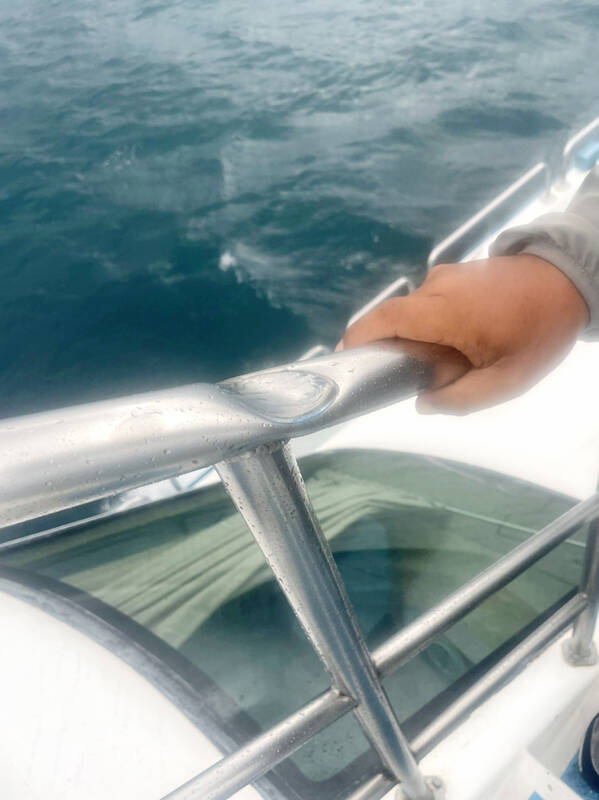A forensic examination of paint from a whale-watching boat ruled out a theory that it had been hit by a mortar on Oct. 20, the Ministry of National Defense said yesterday.
Paint samples collected from the boat on Oct. 21 were sent to a national certified lab to see if paint from a mortar could be detected, Major General Lee Chien-ching (李健青) of the Armaments Bureau told a news briefing.
The test results that came back on Monday found traces of metals, including barium, lead and chromium, in the paint sample, but there was no trace of antimony, Lee said, implying that the element is used in paint for mortar casings.

Photo courtesy of a tour operator surnamed Chien
That meant that a mortar did not hit the boat, he said.
Lee did not say if there were any findings that could help identify what the object actually was.
The boat’s operator Chien Ming-yi (簡明義) said that the vessel was hit by a “black object” that fell from the sky while it was on a whale-watching tour off the coast of Yilan County with 29 passengers.
The object hit the cockpit’s windshield, cracking it, and then struck the stainless steel railing, denting it, before falling into the sea, Chien said.
He said that some of the passengers later told him that they believed the black object looked like a mortar or missile.
Their suspicions were further fueled when they learned that the military was conducting a mortar drill nearby when the incident happened.
The military said the tour boat was close to an area where Taiwan’s Armaments Bureau was testing mortars not loaded with explosives between 2pm and 4:30pm, but said it suspected the object might have been a piece of driftwood.
Lee yesterday said the military’s radar records showed that the boat did not enter the restricted area during the mortar testing period.

An undersea cable to Penghu County has been severed, the Ministry of Digital Affairs said today, with a Chinese-funded ship suspected of being responsible. It comes just a month after a Chinese ship was suspected of severing an undersea cable north of Keelung Harbor. The National Communications and Cyber Security Center received a report at 3:03am today from Chunghwa Telecom that the No. 3 cable from Taiwan to Penghu was severed 14.7km off the coast of Tainan, the Ministry of Digital Affairs said. The Coast Guard Administration (CGA) upon receiving a report from Chunghwa Telecom began to monitor the Togolese-flagged Hong Tai (宏泰)

Actor Lee Wei (李威) was released on bail on Monday after being named as a suspect in the death of a woman whose body was found in the meeting place of a Buddhist group in Taipei’s Daan District (大安) last year, prosecutors said. Lee, 44, was released on NT$300,000 (US$9,148) bail, while his wife, surnamed Chien (簡), was released on NT$150,000 bail after both were summoned to give statements regarding the woman’s death. The home of Lee, who has retreated from the entertainment business in the past few years, was also searched by prosecutors and police earlier on Monday. Lee was questioned three

RISING TOURISM: A survey showed that tourist visits increased by 35 percent last year, while newly created attractions contributed almost half of the growth Changhua County’s Lukang Old Street (鹿港老街) and its surrounding historical area clinched first place among Taiwan’s most successful tourist attractions last year, while no location in eastern Taiwan achieved a spot in the top 20 list, the Tourism Administration said. The listing was created by the Tourism Administration’s Forward-looking Tourism Policy Research office. Last year, the Lukang Old Street and its surrounding area had 17.3 million visitors, more than the 16 million visitors for the Wenhua Road Night Market (文化路夜市) in Chiayi City and 14.5 million visitors at Tainan’s Anping (安平) historical area, it said. The Taipei 101 skyscraper and its environs —

WAR SIMULATION: The developers of the board game ‘2045’ consulted experts and analysts, and made maps based on real-life Chinese People’s Liberation Army exercises To stop invading Chinese forces seizing Taiwan, board gamer Ruth Zhong chooses the nuclear option: Dropping an atomic bomb on Taipei to secure the nation’s freedom and her victory. The Taiwanese board game 2045 is a zero-sum contest of military strategy and individual self-interest that puts players on the front lines of a simulated Chinese attack. Their battlefield game tactics would determine the theoretical future of Taiwan, which in the real world faces the constant threat of a Chinese invasion. “The most interesting part of this game is that you have to make continuous decisions based on the evolving situation,